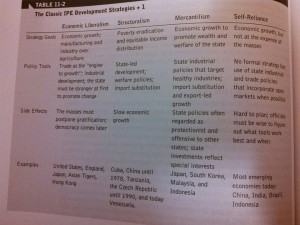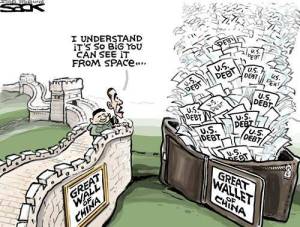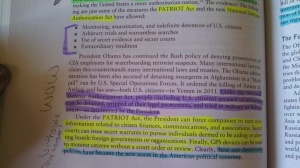In our blogging thus far for our class on the international political economy, we have covered topics from the NSA to the rights of indigenous peoples to try and answer the question “can national security and individual freedoms be reconciled?” While the question is one that needs constant explanation and revision, we have sought to cover different angles of  analysis including economic liberalism, protectionism/mercantilism, and structuralism. While these three perspectives observe the international political economy, they are applicable to our issue because we looked at how national security on a global level affects citizens of many countries, and national security and individual freedoms are interlinked with economics.
analysis including economic liberalism, protectionism/mercantilism, and structuralism. While these three perspectives observe the international political economy, they are applicable to our issue because we looked at how national security on a global level affects citizens of many countries, and national security and individual freedoms are interlinked with economics.
When it comes to the line between national security and individual freedom, one has to think of the Social Contract. In order for it to be successful and benefit the whole, each individual has to give up some ‘rights’ or benefits to be a part of the system. Like privacy; we give up our some of our rights for privacy in order to secure the safety of the whole population (like when you get patted down by the TSA). It’s not an attack on the individual, but a collective bargain between us and the government to allow the way our society functions to continue. The line between what is just to ask and take, and what we have to hold onto for our rights is the constant struggle. In our society, it’s a given that some rights will be infringed upon but we have to decide when it’s for the benefit of the whole and when it’s not. How far is too far, and when is too much? This is a question we have to continually ask ourselves and confront whenever we feel like there is injustice going on. In order for progress to continue, we cannot let questions like this go answered. Boundaries between government intervention and personal freedoms is one that has to continually be re-evaluated and re-adjusted according to general consensus.
Unfortunately, national security cannot always be reconciled with individual freedoms. The actions of the NSA are proof of that, as they monitor emails and calls of the public without their knowledge for the sake of “national security”. There will always be the question of how far is too far when it comes to trying to keep the nation safe. Is spying on their own people acceptable? Is censoring the news? The government has decided before to censor the news in order to not panic the masses, but is that fair? The public has a right to know what’s going on, not just what the government deems okay for us to know, but that doesn’t happen because the government has decided to put the perceived risk that a panicked public is to the security of the nation before that right. There needs to be a limit to what the government can and cannot do. National security is important, but if the individual isn’t free, then its no longer a nation as much as a prison.
The topic of national security can be either reconciled or debated, but both sides yield the following idea: We, as a nation, must work in both a small-scale and large-scale effort in order to match our individual interests with national interests.
The gap of separation between national interests and individual interests must be closed. In order to fill this gap, we can support the idea of people using their individual freedoms to enhance national security. For example, volunteer organizations like the Peace Corps, military members, activists, journalists, and citizens alike must all submit themselves and their individual interests in order to serve a national interest, in doing this, the interests of the state and individual ultimately become one. In our text Introduction to International Political Economy, by David N. Balaam and Bradford Dillman, the authors write that they “realize that solutions requiring shared sacrifice” are difficult, but we must move past this and see that both sides sacrifice in order for the well-being of all involved (233). We all must contribute our freedoms for national security, and in that way they are reconciled.
From an economic liberalist standpoint, the government should get out of the way and let individual freedoms shape the world because (ideally) everyone acts with their own best interest in mind and they are aware of their affect on others. In reality, acting with one’s best interest is often at the expense of another (as seen with the indigenous peoples as victims of resource extraction). However, if the government did allow for enough independent function of the market, maybe developing countries would have more of a chance in the international market (as seen in our fifth post on LDC’s). From a mercantilist or protectionist perspective, the government has to take the measures necessary to ensure that it’s public is healthy (from our second post on healthcare), safe, and faithful in the current system (from our first and fourth posts on the NSA and censorship, respectively). But, in the same blog post where we talked about the NSA, we also described how national surveillance can be a threat to personal privacy and in our post about censorship, we said that it takes away our individual freedom of awareness. From a structuralist perspective, the government is strong and and the wealthy are rich because they keep the “little people” in the dark through false consciousness and dependency theory. Our third post talks the most about this. Overall, our blog journey has lead us to consider opposing views and various perspectives, but the answer to our deserving question is this: reconciliation involves cooperation from both parties involved. There are no clear answers or solutions that could equally appease national security or individual freedoms; our best bet is somewhere in between, but we have to continually search for that happy medium.




